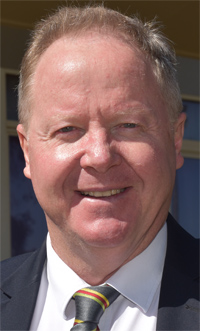
June 21, 2023
A shock last-minute move by South Burnett Mayor Brett Otto to overturn weeks of deliberations failed at Wednesday’s Budget meeting.
Councillors had previously agreed during pre-meeting discussions to bring down a 3.65 per cent rates rise, but just minutes into the meeting Mayor Otto moved an amendment saying he now considered the imminent threat of drought – and what he described as unexpected electricity prices rises – should be taken into account.
He proposed a 2 per cent rise across the board on rural and residential properties.
To make up a portion of the almost $250,000 gap this would create across the Budget projections, he proposed slugging the Tarong Power Stations, Meandu Mine and renewable power projects with a 25 per cent rate rise.
Cr Kirstie Schumacher warned the Mayor that unless this proposal could be justified due to changes in employment numbers or other factors, it could be challenged in court, and this had occurred previously.
Mayor Otto said the proposal could be justified due to the impost on Council roads caused by these “heavy industries”.
Deputy Mayor Gavin Jones pointed out that both the coal mine and Tarong Power Station could only be accessed by State-controlled roads.
After extensive debate – and breaks to allow Council staff to process exactly what a 2 per cent rate rise, or a 2.65 per cent rise, would mean to Council’s bottom line, Mayor Otto’s amended motion was put to a vote and was defeated five votes to two, with only Cr Kathy Duff supporting the Mayor’s position.
The original Budget motion was then voted on, with both the Mayor and Cr Duff voting against.
This means general rates will rise by 3.65 per cent, setting the lowest general rate at $1034 a year.
The Rural Fire Brigade levy will stay at $25 a year; and the Community Rescue and Evacuation Levy, which supports RACQ LifeFlight, will remain at $5 for all rateable properties.
The Waste Management Levy will rise by 6 per cent to $185, and so will Waste Collection charges, which will rise to $192 a year for residents receiving a weekly waste collection service, plus an extra $74 a year for residents receiving a fortnightly recyclables service. Bunya Mountains residents will now pay $231 a year.
Sewage charges will rise by 3 per cent to $784 for the first pedestal and $525 per extra pedestal, except for houses connected to the Proston Common Effluent System where charges will be $462 for a first pedestal and $310 per extra pedestal.
Water supply charges will rise by 1 per cent to $737 a year, and $369 for vacant properties.
Saleyard fees will rise to $7.50 per beast. The Budget meeting was told this rise followed extensive consultations with local livestock agents and would help fund future upgrades to the Coolabunia Saleyards.
Council will retain its $200-a-year pensioner discount for rates notices, along with its 30-day, 10 per cent discount for prompt payments.
It will extend the deadline before interest is charged on outstanding rates bills from 30 days to 60.
Council will also extend a full general rates discount to QCWAs, youth accommodation services, youth groups such as Scouts and Girl Guides, Senior Citizen and welfare groups, kindergartens, service and sporting clubs, showgrounds, race tracks, museums and heritage organisations, charitable organisations and community-owned halls.
It will also embark on the second year of its three-year averaging process to help relieve some of the pain caused by a steep land revaluations carried out by the Valuer-General in 2021.
These rises particularly affected rural residential properties in the Blackbutt area.
New Differential Rating Categories have been created for heavy industry, multi-unit dwellings, transformers, piggeries, feedlots; and the wind farm and solar farm rating categories have been combined.
Near the end of the Budget meeting, Cr Schumacher described the Mayor’s action of voting against the Budget, after months of deliberations, as a “media stunt” and a way for him to avoid responsibility and accountability.
Mayor Otto vehemently rejected this, saying it was unfair, personally offensive and a breach of standing orders to infer motives on colleagues in Council.
Cr Schumacher withdrew the allegation the Mayor’s vote was a stunt.
Wednesday’s 3.65 per cent rates rise is the largest during this term of Council, but lower than the 4 per cent brought down by the Toowoomba Regional Council earlier this month.
It follows a zero per cent rise in the South Burnett in 2020-21, a 1 per cent rise in 2021-22 (zero for rural properties) and a 1.75 per cent rise in 2022-23.
In comparison, TRC rates rose 2.5 per cent during each of these three periods.
On Wednesday, Western Downs Regional Council handed down an average general rates rise of 3.8 per cent.
* * *
Budget Highlights
The total Operational Budget is $81 million up from $72 million in 2022-2023. This includes:
- $2.1 million – Bitumen resealing program
- $1.9 million – Pavement Rehabilitation Tingoora-Chelmsford Road
- $2 million – Council contribution to flood damage restoration works
- $1 million – Major mechanical repairs
- $1.5 million – Wondai CBD & roundabout upgrade
- $770,000 – Home Creek Loop Road Bridge
- $500,000 – Shoulder resheeting program
- $1.4 million – Kingaroy to Murgon Rail Trail pavement reseal and crossing repairs
- $450,000 – Murgon QEII Park redevelopment
- $450,000 – Kingaroy Memorial Park Youth Precinct redevelopment
- $730,000 – Murgon PCYC bathroom and squash viewing platform renovations
- $2.65 million – Utility and Truck Renewals
- $250,000 – Establishment of Maidenwell Transfer Station
- $303,000 – Completion of Nanango weighbridge
- $1.75 million – New Mount Wooroolin reservoir
- $800,000 – Gordonbrook Dam spillway works
- $1.6 million – Regional sewer relining
- $205,000 – Coolabunia Saleyards upgrades
- $340,000 – Regional swimming pool upgrades
* * *
Deficit
Overall, the SBRC’s Budget will produce a predicted $3.48 million deficit, however on paper this could rise to $6.3 million or as high as $10 million, depending on the timing of the payments this financial year of the Federal Government’s Financial Assistance Grants.
Council CEO Mark Pitt emphasised these were not “grants”, but rather a share of taxation revenue which all councils receive, and which has been brought forward in recent years.
“The timing of the payment of this grant has no material impact on our Council’s financial position, which is strong,” Mr Pitt said in a media statement.
“What it does impact is our financial statements.”
He said any discussion about “financial sustainability” based on this accounting treatment would be “a moot and irrelevant point”.
* * *
Borrowings
There will be no extra borrowings by Council over the next 12 months.
However, Council will be looking to borrow in 2024-2025 and 2025-2026 to assist with costs associated with the mandatory Gordonbrook Dam wall upgrade.
Council’s borrowings with the Queensland Treasury Corporation are predicted to be $27,147,746 for June 2023.
Total borrowings will be reduced down to $23,796,091 over the next 12 months through loan repayments, with a large portion of Council’s loans due to be paid out by 2030-2031.
This is compared with a peak in borrowings of $44,931,544 in 2016.
* * *
* * *
[UPDATED]






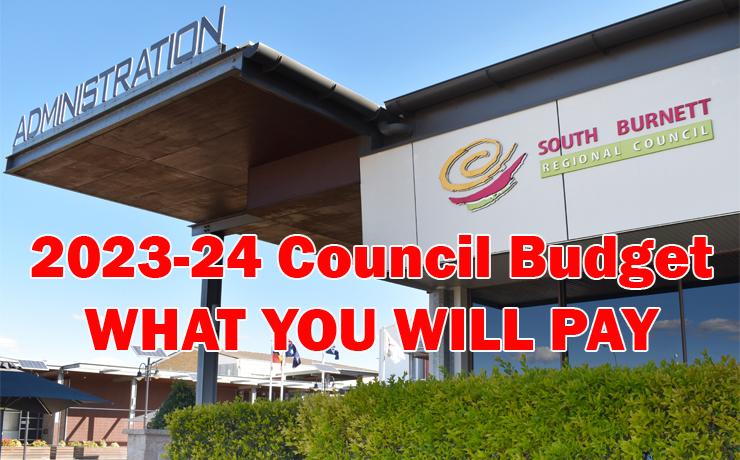
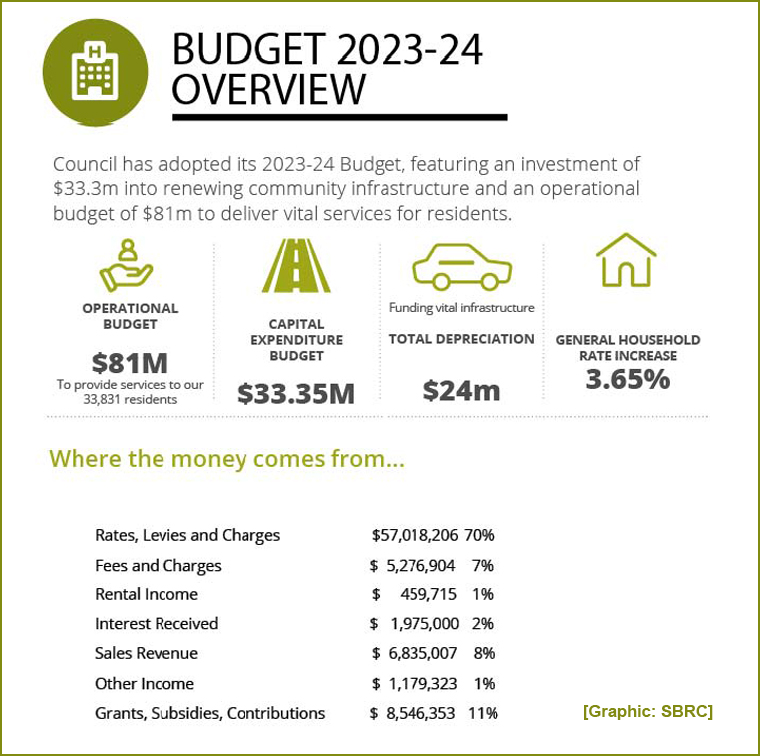
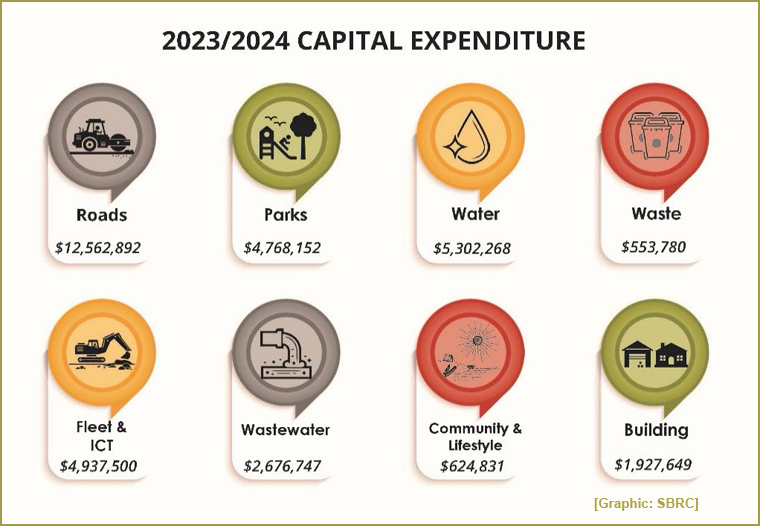
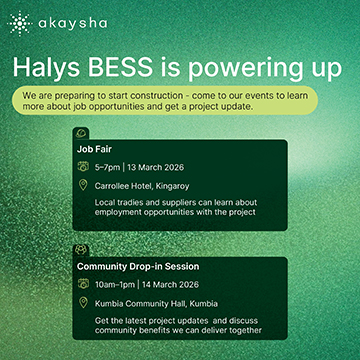

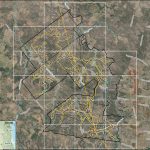

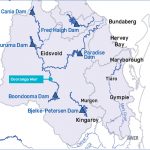

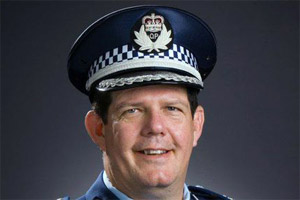











I personally have no issues with paying rates and increases are inevitable, but poor management and spending on assets that are liabilities are beyond a joke, eg. halls, libraries, pools and office staff numbers is ridiculous high ratio.
Trim the fat, I say. It’s been 10 years minimum since I personally set a foot in any of these facilities in the SB. Phone and internet have made them obsolete IMO.
Were Mayor Brett Otto and Cr Kathy Duff looking to separate themselves from the months of discussions in which all Council members participated to formulate and develop the 23/24 Budget?
Their last-minute call to reduce the agreed rating schedule looked like a media stunt! There is no doubt that the Mayor and Cr Duff were looking to draw attention to their interest in preserving a feeling that they are the only two Councillors working for the battlers.
What needs to be looked at is the longer-term sustainability of the South Burnett. Droughts do happen, and so do favourable seasons, for farmers.
As for pensioners living in the South Burnett, there are many (as elsewhere). Happily, though, a larger percentage of residents are financially secure by varying degrees. Not all pensioners are destitute.
As an accountant, for the Mayor to preside over every budget in his term with a deficit, surely questions his level of understanding of how to progress the South Burnett.
Deficits for Council have a significant impact and risk over the longer term, about which everyone should be concerned.
This Council has delivered dysfunction in terms of a unified approach to build on stability, growth and security.
Here we go again. Mayor Brett Otto always has the community, for which he serves, at heart. He is not just trying to make life easier for pensioners but all residents of the South Burnett. I have said this before, but how about recognising what he does try to achieve in challenging circumstances, rather than continually criticising his efforts.
I would like to congratulate our Mayor on standing up for our community by once again arguing for more efficiencies in Council’s operations and trying to minimise rates for our Mums and Dads, struggling pensioners and farmers.
Throughout the budget process he put forward proposals to change the rate system to ensure all heavy industries, including the broader power generation sector, were making a larger contribution to Council rates because of the impact those industries have on our road network.
He also put forward suggestions for more efficiencies including reducing the number of white utes and other cost-saving measures.
Councillors listened but, as I said in my address, that there is a difference between listening and actually taking notice of these proposals.
The Draft Budget was put forward with a 3.65% rate rise but it was certainly not previously agreed to, as that decision, as is stated in the Local Government Act, can only be made at the final budget meeting. Our Mayor took the Draft Budget out to the community and received feedback that we have a vulnerable community struggling with the rising costs of living.
Our Mayor put forward a 2% alternative that I supported and unfortunately it was defeated.
Please note these are my personal views only, I am not speaking on behalf of Council and I respect the majority view of Council.
The comment by Cr Duff suggests the Mayor’s decision-making barometer is governed by capturing the comments of a handful of people. The audience catchment of the Mayor, speaking to the community for comment, certainly is not reflective of the greater masses of ratepayers.
If Council, in its long period of deliberations, has not seen fit to reduce its services and ‘white fleet’ in the lead up to the official budget, then please stop applying this innocuous red-herring statement about poor pensioners and poor farmers.
Arguing for more efficiencies in Council’s operations and trying to minimise rates is against the expectations of ratepayers. Council could spend less on roads, libraries, swimming pools and parks and gardens to name a few areas that could be targeted. Ratepayers know that if rates are to be reduced, then these services and others would need to be curtailed.
This argument has been replayed many times over the years without effect. The great majority of ratepayers, it would seem, may like to pay lesser in rates, but do not want to give up any services and facilities.
In different areas, ratepayers keep asking for more, and some Councillors are keen to support their requests. Put simply, having more services and facilities means it will cost more in rates. On top of that there is the CPI issue to deal with. People are not stupid. Rates and taxes are a fact of life.
Neighbouring Councils have all had rate increases in the range as endorsed by the South Burnett. What makes the South Burnett so special that it should not expect to be applying similar increases? It would not be surprising to find that Toowoomba and Western Down would have the same issues of “poor pensioners and poor farmers”.
There is a simple solution to the problem of increasing costs, get rid of some of the liabilities! None of the swimming pools in the South Burnett make any money but no councillor has the guts to tell their town that their pool should be closed. So how about selling a couple?
Murgon, Nanango and Wondai are all stand-alone facilities that could be bought and operated by a private company. With a bit of entrepreneurial spirit and advertising maybe they could even turn a profit for someone.
Maintaining libraries are one of the “assets” mentioned that cost the Council a lot of money. There are 6 of them in the shire. Would it be possible to have a library bus for the 4 smaller townships? Maybe with a volunteer driver and assistant to visit Murgon, Proston, Wondai and Blackbutt on set days of the week?
In relation to the comment about getting rid of libraries, the Wondai Library is in the Council office. So if he/she wants to close Wondai Library, does he/she also want Wondai office to close? That would make it more expensive for country people to access facilities, having to drive to Kingaroy to conduct business, leaving the shops in these smaller towns missing out once again. Think of the benefits for the smaller towns before such comments as above are made.
I agree with what Peanut Chipper said. There are, however, more ways to help solve the problem of increasing costs and one of them is to cap salary increases for all council staff (including councillors) for a number of years. Simply meaning, no pay increases to their already high salaries which would result in huge savings.
And to Bookworm, while I think your suggestion deserves merit, I really think our rates should cover the cost of maintaining our fabulous libraries. They are an asset for all age groups and always a great place to visit, not just to borrow books, but to attend many of the organised classes which attract like-minded people. Also wonderful for children, particularly in school holidays.
No way that the suggestion of a library bus was meant to say that Council offices in the smaller towns should be closed – far from me to suggest such a thing as I agree with Michelle. If rooms at Council offices are no longer used as libraries, they still could be used for other activities, just without books lining the walls – would that be ok, Julie? Meeting at the Library Bus when it stops in town could also provide a place for social interaction, especially if there was a coffee shop nearby!
I was surprised to hear during the short time I listened into the livestream that there was no mention of Council investing in installing solar panels on its vast array of buildings with rooftops and other unusable vacant land to offset the looming 25% increase in electricity prices to run Council’s operations on behalf of ratepayers.
I often wonder what would be possible along with the savings to ratepayers if progressing the South Burnett was more than a tag line on a billboard.
Yes, accounting rules for local government would require the investment to be accompanied by funded depreciation from rates, but has any genuine study been undertaken during this term of Council to map out a long term plan between community and council to convert stranded council assets into incoming earning, expenditure saving options for ratepayers?
Large industry, who employ hundreds of people in the South Burnett would appreciate it.
Here we go again! Cr Duff and Mayor Otto as usual trying to win the votes of the public by making out as if they’re the only ones trying to look out for the people of the South Burnett. But only as long as you’re a farmer, pensioner or in Division 5.
Once these two are out, Council officers’ workloads will be quartered just in the reduction of QONs and council reports every month. Then maybe council staff can get back to doing their jobs, rather than replying to the power trip requests.
I find it interesting that no Councillor has ever qustioned how much has been spent on our region’s pools over the past 10 years and weighed this against the income these pools produce for ratepayers.
I suspect this is because if they did this, it would soon become apparent that the 90% of the population who don’t use the pools are paying a hidden “pool tax” to support the 10% that do.
Most Queensland councils have one pool to service every 125,000 to 250,000 residents, but the South Burnett has 6 pools to service 33,000 people. Something is clearly wrong here, and we’re entitled to know why this is so.
Everything the mayor and councillors say or propose is a load of political BS aimed at trying to keep a good name for themselves.
Instead of continually slugging residential ratepayers with ongoing increases, why not start rezoning the commercial and industrial business that the SBRC has allowed to operate on residentially zoned premises. Not only do these operations lower housing values, but they put more pressure on our facilities (water, sewerage, waste collection, noise and pollution, increase risk of fires, environmental hazards etc), yet they still pay the same rates as a residential ratepayer.
I don’t mind paying rates when it is to the benefit of the community, but when this sort of crap occurs, its time to vote them out!
Well, Had Enough, we don’t vote people out, we vote people in. So come the next council election in March 2024, be careful what (or who) you wish for.